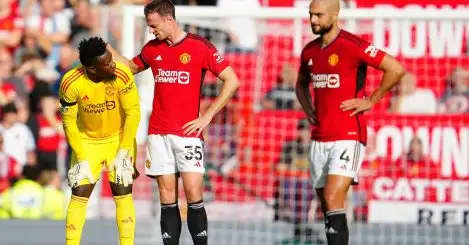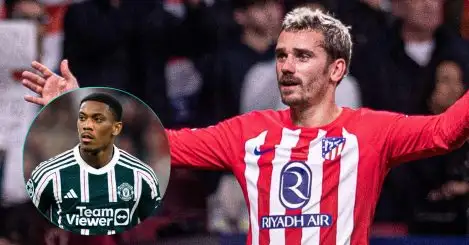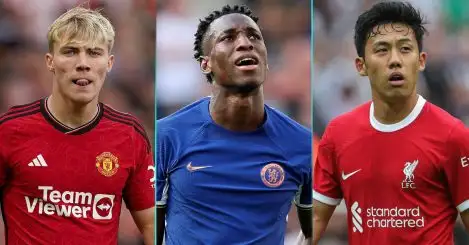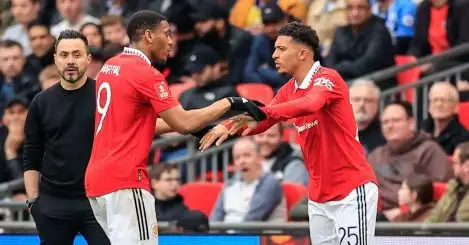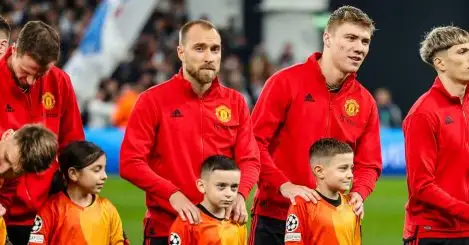Can Rasmus Hojlund diverge from massive Man Utd parallels with Anthony Martial?
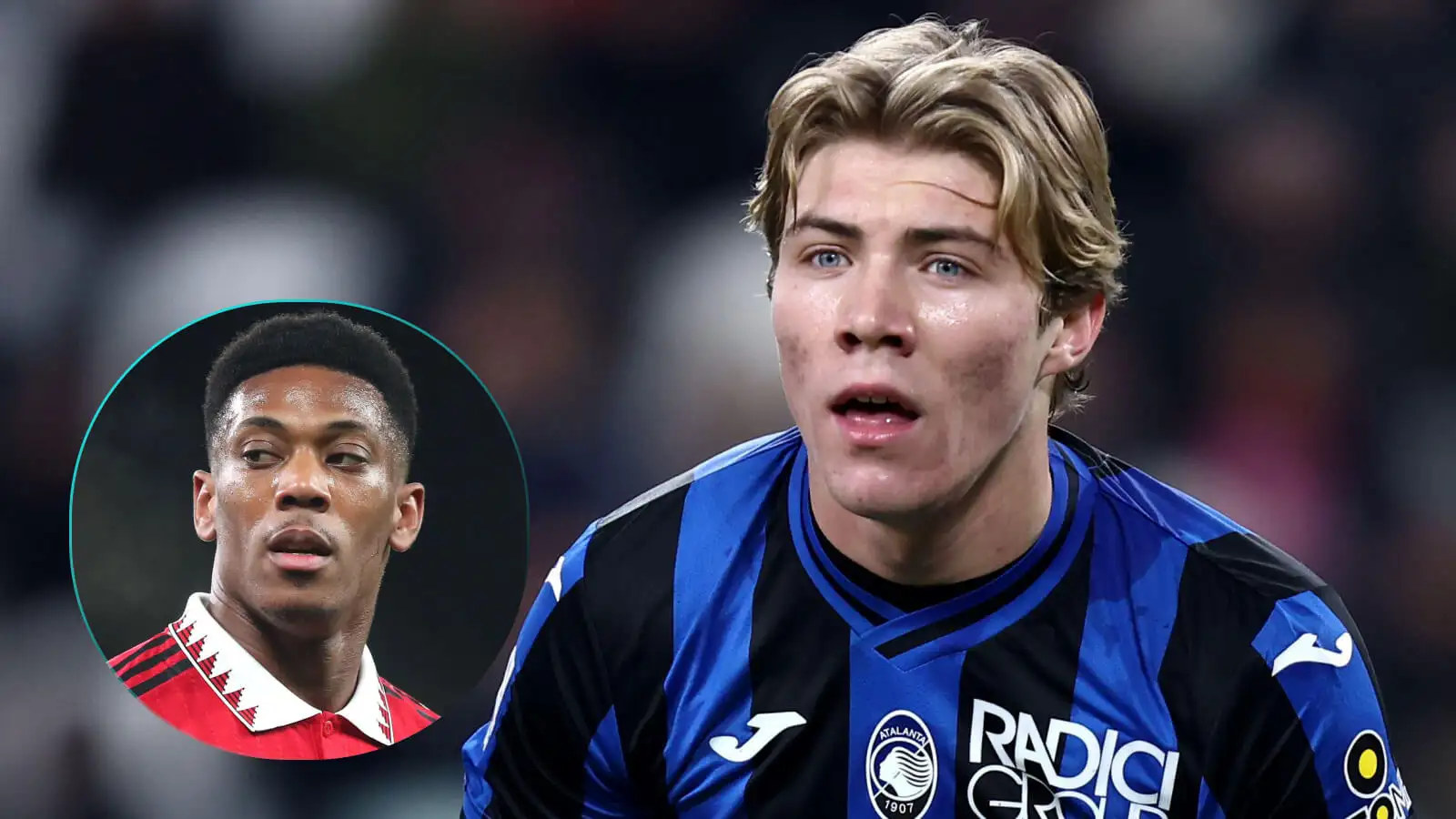
Rasmus Hojlund would be a risky, expensive, untested Man Utd signing for the future like Anthony Martial. But this is not the banter era anymore.
Spurs owner Joe Lewis’ reported insistence that Harry Kane is sold this summer if he won’t sign a new contract (the sh***est ‘ultimatum’ in football history?) has led to suggestions Manchester United could re-ignite their interest in the England captain.
But a deal still seems a stretch given Daniel Levy’s vow not to do business with a fellow English club, as well as the exorbitant fee and wages involved, which would make Kane Manchester United’s biggest earner by an uncomfortable margin.
It appears more likely that United’s summer-long search for a striker will see them land Rasmus Hojlund, with an opening bid for the Atalanta youngster expected this week and a deal not far behind.
If, and more likely when, the Danish international arrives at Old Trafford, he will become the ninth striker to join the club in the ‘post Fergie wilderness years’ ™. Of that nine (many of whom are ranked here), he will become just the third under the age of 25 and only the second who would not be able to buy a drink on their current US tour.
The only other striker signed in the last 10 years under the age of 21 is unsurprisingly the one he has the most in common with, and rather ironically the player he is being signed to replace: Anthony Martial.
If you will, cast your memory back to August 2015: United and their Dutch manager (set to embark on a second season in charge) sign a precociously talented, if raw and unproven, young forward in a deal that could be worth up to £58m.
Sound familiar? Swap Monaco for Atalanta, Louis van Gaal for Erik ten Hag and Martial for Hojlund and you have yourself a near-exact same scenario. Both even scored nine league goals in the season before their Manchester United move.
But this is where the similarities should end for both club and player; if Hojlund is wise, he will learn from Martial’s extended spell at the club, which looks set for a ninth season (it’s not just cats who have nine lives, is it?) unless the Saudi Pro League come calling.
The signs are far better in 2023 than 2015. Firstly, Hojlund is clearly not a panic buy in the mould of Martial (and so many players in the Ed Woodward era). He’s been earmarked as a player of immense potential by Ten Hag for several months, with interest being registered before the end of last season. The two men are SEG agency clients, so there is little doubt background checks and a full scouting report have been conducted.
On the contrary, Martial joined four league games into the 2015/16 season when Van Gaal realised that Wayne Rooney was winding down, Memphis Depay was nowhere near ready and Adnan Januzaj just wasn’t his cup of tea.
Not that it stopped Martial from displaying the ability that saw him likened to fellow Monaco alumni Thierry Henry in his formative years.
Seventeen goals came in his first season, including a memorable debut strike against Liverpool (Martin Tyler not doing much to calm the paranoia of bias among Scousers) and a late FA Cup semi-final winner against Everton, which put United on their way to their first trophy in three years.

All seemed well. Until it wasn’t. LVG was sacked minutes after lifting the cup and replaced by Jose Mourinho, who brought in his on-field lieutenant, Zlatan Ibrahimovic, and the Swede’s supposed heir in Paul Pogba.
Both players’ arrivals would alter the shape and direction of Martial’s United career.
While direct blame cannot be placed on Pogba for the plight of his fellow Frenchman, he was a) someone he admired and b) someone who didn’t always set the best example. Hojlund will find himself in a comparable situation, but you suspect Christian Eriksen will be a more calming figure for his younger international teammate.
His number 9 shirt was unceremoniously stripped from him and given to Zlatan, which dented his ego and confidence, unsurprisingly for a 20-year-old who’d been a rare highlight in an otherwise desperately turgid campaign.
This would begin a pattern for Martial at United, where he struggled to rise to the challenge posed by new signings, often having his nose put out of joint by the arrival of anyone who threatened his mandatory starting position.
This is something Hojlund must expect coming to Old Trafford. If Ten Hag is to get the club back among the true elite, competition for places across the board is a given. City have a World Cup-winning striker on the bench and Phil Foden competing with Jack Grealish for a starting spot. That’s the standard.
Romelu Lukaku was less of an issue for Martial but Alexis Sanchez’s arrival halfway through the 2017/18 season knocked the Frenchman out of sync again, with none of his 11 goals coming after the Chilean’s arrival.
It also didn’t help that Mourinho tried to sell him to fund a move for Ivan Perisic only to be allegedly vetoed by Joel Glazer, whose favourite player was United’s now No.11. This was the Manchester United banter era personified.
New life was breathed into his career under Ole Gunnar Solskjaer, whose approach was the antithesis to Jose. A career-high 23 goals came in the Norwegian’s first full season in charge, which saw him win the club’s Player’s Player of the Year award and regain the No. 9 shirt.
But then the arrival of another South American forward from PSG on a free transfer (Edinson Cavani was Sanchez and Zlatan nightmarishly combined) would see Martial shrink once more, and again a year later when Cristiano Ronaldo joined in another commercially driven move.
The 2020/21 season is the last time the striker completed a full 90 minutes in the Premier League as another trend – that of non-availability – worsened.
He started just 11 league games last season when gifted with a last shot at being a United player after a dismal loan spell with Sevilla, forcing United to add Wout Weghorst to the Odion Ighalo centre for strikers who can’t score good.
Hojlund will hope to join a more stable and coherent set-up and is likely to find one; it seems very unlikely Ten Hag will be leaving any time soon, and the chances of five managers in eight seasons (six if you include Michael Carrick’s three-game stint in charge) appear slim.
Fitness, conditioning, availability and mentality have to come mostly from within, and will be major factors in deciding whether the Dane will go the way of Martial and too many United strikers of the last decade or join the pantheon of great strikers in the club’s history.
But the good news for Hojlund is that this is no longer the Manchester United banter era so his chances of being Martial Mark II are drastically reduced despite the obvious parallels between the pair.
